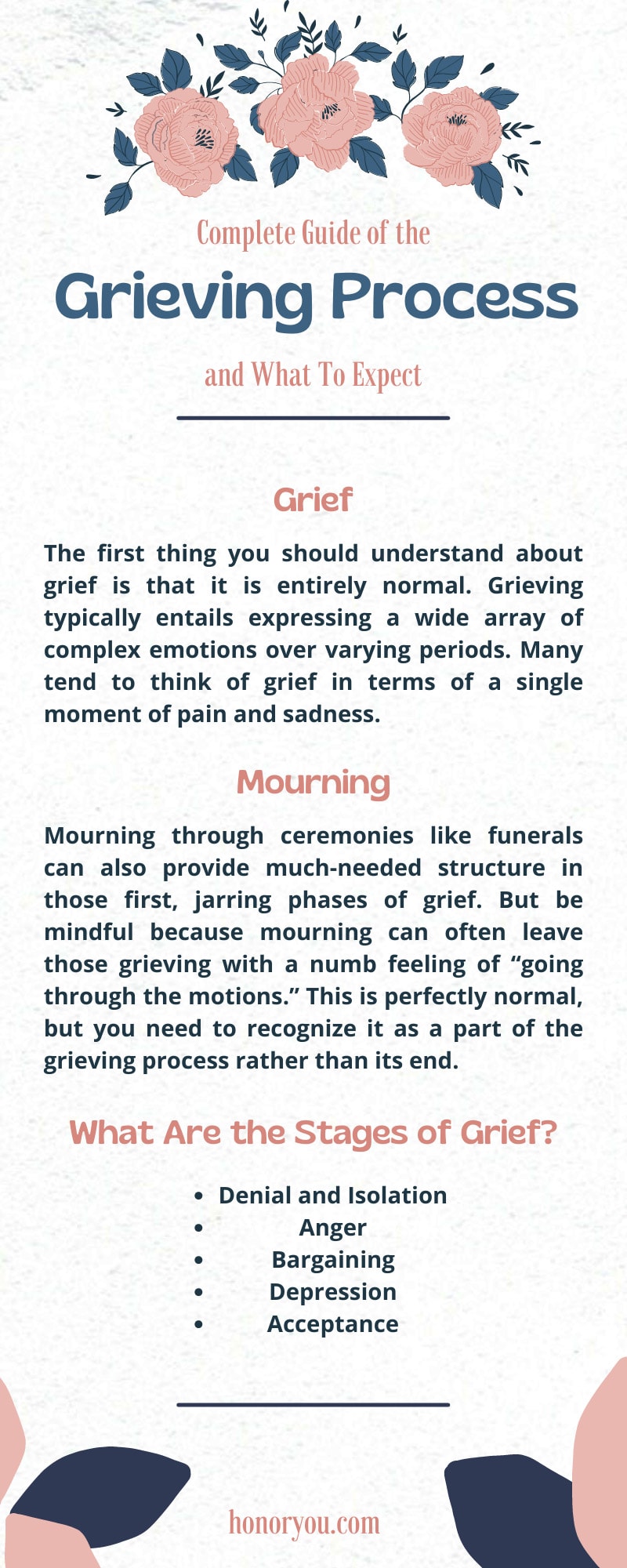Complete Guide of the Grieving Process and What To Expect

3 Ways To Honor a Loved One Who Has Passed
March 15, 2022
Messages To Expect in a Funeral Register Book
March 31, 2022We’ve said it many times, but it will never stop being true: losing someone close to you is one of the most difficult and emotionally complex experiences that you will ever encounter. For that reason, it’s imperative to understand how significant loss might impact your emotions and behaviors.
Further, it’s helpful to know what to expect as you move through the multi-faceted process of grieving. Fortunately, we’ve put together this complete guide of the grieving process and what to expect to provide some insight.
What Are Grief and Mourning?
Grief
The first thing you should understand about grief is that it is entirely normal. Grieving typically entails expressing a wide array of complex emotions over varying periods. Many tend to think of grief in terms of a single moment of pain and sadness.
But until the moment it washes over you, there’s no way to know how long your grieving process might last. After all, grieving encompasses the entire process of coping with a significant loss. This means that it could last a few weeks, months, or even years.
Grief—as a whole—involves numerous emotions, expressions, and even actions that might be hard for those outside an individual’s situation to grasp. However, these different components will ultimately help those grieving come to terms with their loss. Overall, the essential thing to know about grief is that it’s fundamental to healing.
Mourning
Grief is complicated. It comes with a vast spectrum of expressions and shows itself in many forms. For example, mourning is another iteration of grief that’s important to understand. Grief, in its most basic definitions, tends to represent a personal or individual experience.
On the other hand, mourning indicates how you show grief and loss publicly. This particular process may involve religious rituals, gatherings with friends and family, funeral preparations, and even personalized funeral gifts. This collective grieving allows those personally impacted by the loss to gather and express their sadness together.
Mourning through ceremonies like funerals can also provide much-needed structure in those first, jarring phases of grief. But be mindful because mourning can often leave those grieving with a numb feeling of “going through the motions.” This is perfectly normal, but you need to recognize it as a part of the grieving process rather than its end.
What Are the Stages of Grief?
Once a loved one passes, the only accurate indicator for how you progress in your healing is the five stages of grief. Think of these emotionally charged phases as stepping stones on your way to grieving and processing the loss of someone you cherish so that you can move forward.
Each of these stages has its unique behaviors and feelings. For this reason, we’ve decided to list a few of the strongest indicators for each step. Perhaps it can help you or someone you love understand their grief more clearly.
Denial and Isolation
First comes denial and isolation.
In terms of behavior, denial can look like:
- Avoidance
- Procrastination
- Mindless behavior
- Distractibility
In terms of emotion, denial can feel like:
- Shock
- Numbness
- Shutting down
- Confusion
Anger
Soon after denial sets in, it often transforms into anger.
In terms of behavior, anger often looks like this:
- Pessimism
- Irritability
- Aggression or passive-aggression
- Increased alcohol or substance use
Emotionally, anger can present itself as:
- Frustration
- Impatience
- Resentment
- Lack of control
Bargaining
After anger makes its way out, bargaining typically pays a visit.
Behaviorally, bargaining comprises of:
- Over-thinking and anxiousness
- Comparing yourself to others
- Perfectionism
- Feelings of self-blame for what happened
In terms of emotions, bargaining can make a person feel:
- Shame
- Guilt
- Insecure
- Fear
Depression
After you bargain, the weight of loss starts to set in and lead to profound sadness.
Behaviorally, depression makes itself known with:
- Sleep and appetite changes
- Reduced energy and social interest
- Crying and lack of motivation
- Increased alcohol or substance use
In terms of emotions, depression feels like:
- Profound sadness
- Disappointment
- Being overwhelmed
- Helplessness for your loss
We feel compelled to point out that depression is a severe health issue. So when you begin to experience these symptoms, lean on those who love you and ask for help. If these symptoms persist for an extended period, we strongly encourage you to seek professional grief counseling.
Acceptance
Once depression makes its way out the door, the clouds clear up a little bit, and acceptance of your situation begins to set in.
You’ll know you’re beginning to achieve acceptance when your behavior becomes more:
- Mindful
- Engaged with reality
- Vulnerable and tolerable of emotions
- Assertive, non-defensive, and honest
You’ll know you’ve accepted the passing of your loved one when you start to feel:
- Good enough
- Courageous
- Self-compassionate
- Validated
Can Grief Arise in Unexpected Ways?
You may be wondering if grief can arise in unexpected ways. The answer is yes. Before the passing of a loved one, it might be challenging for some to see how dramatically grief can impact them. This is especially true for those who saw the deceased through a long period of illness or had a complicated relationship with them in life. But many are typically surprised by the painful reactions that arise after their loved one passes.
This is especially true when something seemingly less important creates a reaction in the grieving. Even something small, like looking at a memorial gift for a funeral, can illicit an unexpected emotional response. Those experiencing this type of bereavement might have feelings of profound distress or mourn the relationship they wish they had with the deceased.
Others might have a sense of relief, and some may wonder why they don’t feel anything at all. Regret and guilt are common feelings that occur during these atypical situations, too. But again—even if you never expected to grieve—having a wave of emotions wash over you after the passing of someone you cared about is ordinary and necessary for adjusting and letting go.
How Long Does the Process Last?
Processing and healing from a significant loss are complex for anyone experiencing it. And each person will have a different method for working through their emotions and sense of grief.
Because of this, the grieving process can last anywhere from a few weeks to several years.
Some might start to feel better once the committal service ends. Others might keep memorial items or plan beloved activities to remember their loved ones for years. Either way, grieving is a delicate and incredibly personal process. As such, there is no set time limit for how long it might last, and that’s OK.
Hopefully, our complete guide on the grieving process and what to expect provided valuable information about how grief can impact you. Moreover, we hope that we could offer some clarity and comfort for those experiencing the complex process of grief now. However you may be progressing in your grief, remember that what you feel is a natural and necessary element of the healing process.



